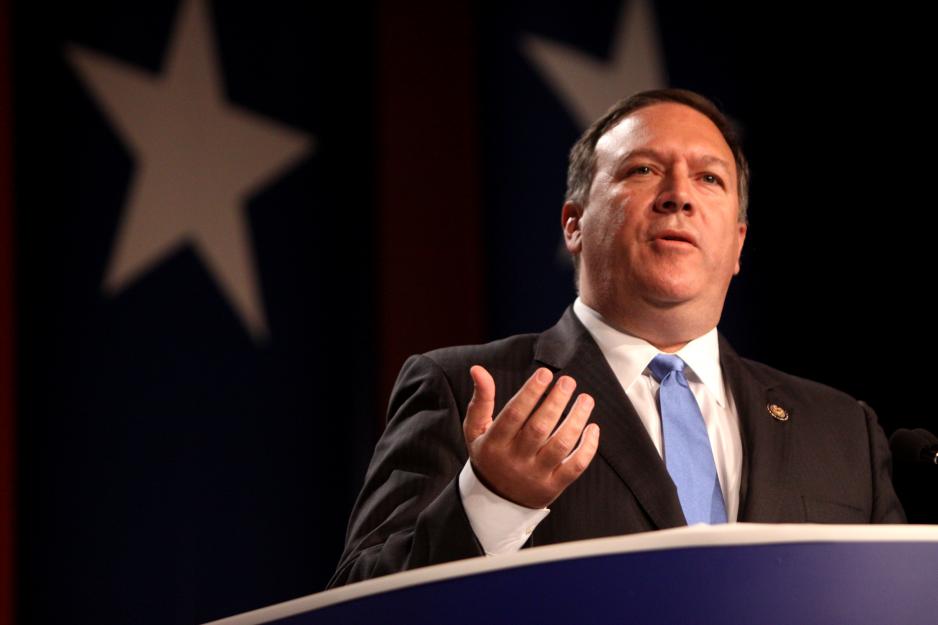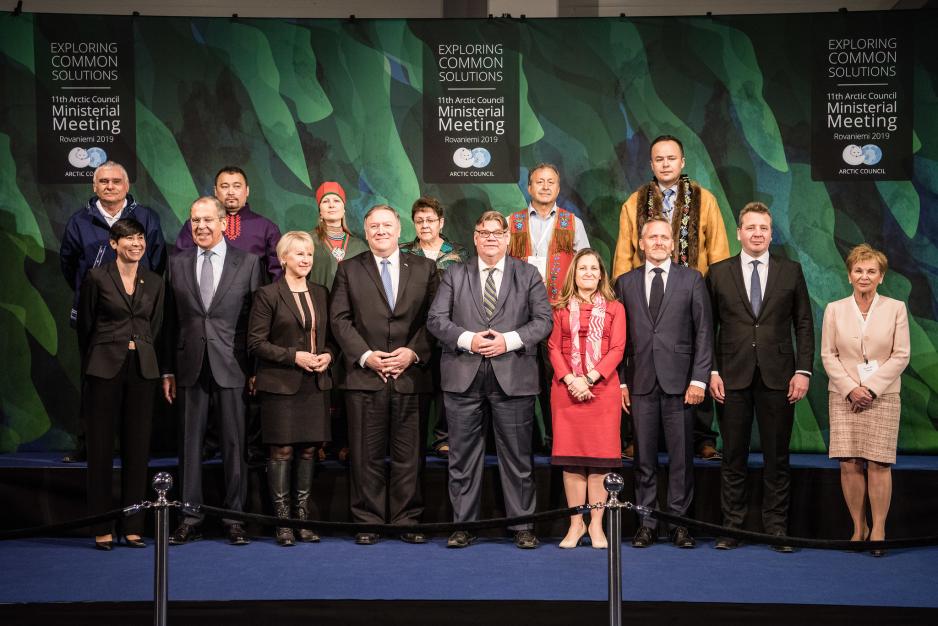Strong Chinese Reactions to Pompeo’s Speech

US Secretary of State Mike Pompeo on a podium in Rovaniemi, Finland the day before the Arctic Council Ministerial Meeting. (Photo: Gage Skidmore)
US Secretary of State Mike Pompeo lashed out at China in Rovaniemi. The Chinese reactions were swift.
Up until now, China’s conservative approach to developing an Arctic strategy has been successful, as the country currently mostly is regarded a significant actor in the Arctic following just a few years’ involvement with the region, Marc Lanteigne wrote in an analysis recently. Lanteigne is a China expert and works as an Assistant Professor at UiT Norway’s Arctic University.
And he continued:
- However, as the number of Chinese-supported development projects in the Arctic increase, as will Beijing’s need to demonstrate its strategic commitment to the High North. The questions will thus be about what direction such a change of policy will take, as well as about the ensuring reactions from Arctic states’ governments, in particular the USA and Russia.
Frontal attack
One can safely argue that such a reaction came when the eight Arctic foreign ministers met in Rovaniemi last week.
In an astonishing speech just hours before the formal Arctic Council Ministerial Meeting, US Secretary of State Mike Pompeo launched a full-on verbal attack on both Russia and China.
- There are only Arctic and non-Arctic states. There is no third category. And claiming something else gives China exactly zero rights, he said, amongst others.
Not only did he attack China; he drew an image of a country without Arctic rights yet behaving as if it does. He referred to what he characterized as China’s aggressive foreign policy in other countries as well as drawing an image of a nation with military and geopolitical ambitions in the Arctic too. At the same time, he rejected the idea that China should have any influence at all in the Arctic.

Norway’s Foreign Minister Ine Eriksen Søreide during the Arctic Council Ministerial Meeting. IN the background are Sergey Lavrov, Russia’s foreign minister, and (to the right) Finnish Foreign Minister Timo Soini. (Photo: Arne O. Holm)
However, while the Chinese who were present in the audience during Pompeo’s remarkable speech mostly just shook their heads and refrained from commenting, the reactions afterwards have been swift and clear.
The Chinese dispute the signals that they, being a non-Arctic state, have fewer rights than others. “Non-Arctic nations enjoy extensive rights in scientific research, navigation, overflight, fishing, laying of submarine cables and pipelines as well as resource exploration and exploitation in these areas” according to an editorial in the China Daily Mail.
Argues that the USA should fear other countries than China
In his speech, Mike Pompeo amongst others asked the question: “Do we want crucial Arctic infrastructure to end up like Chinese-built roads in Ethiopia, roads that fall apart after just a few years? Do we want the Arctic to transform into a new South China Ocean, with increasing militarization and competing territorial claims? Do we want vulnerable Arctic climate to be exposed to the same ecological destruction that has been caused by the Chinese fishing fleet in the oceans around the coast of China?"
This statements lit the Chinese fuse:
“If Washington is worried about territorial claims in the Arctic, it should turn to other Arctic Council members. And it should rest assured that no matter how Beijing defines its relationship with the Arctic, "near-Arctic" or not, it will never be a party in any Arctic territorial dispute.”
China Daily Mail then points back to the upcoming revision of the USA’s Arctic Policy, which is expected by 1 June.
“If the past is any guide to the future it will merely continue the pattern of aggressive behavior the US has shown elsewhere, including in the South China Sea” it writes.
Ludicrous
In an op-ed in the same paper, Zhu Feng, Executive Director of the Collaborative Innovation Center of South China Sea Studies and Dean of the Institute of International Relations of Nanjing University, goes even further.
"China has been involved in the Arctic affairs on the basic principle of "mutual respect, cooperation, win-win result and sustainability". Which makes the US' claim that Sino-Russian cooperation, even in accordance with international treaties such as the UN Charter and UN Convention on the Law of the Sea, pose a threat to the Arctic region ludicrous," he says.
He argues that China can actually contribute to reducing future climate changes in the region.
Commercial interests
Cheng Baozhi, a Senior Fellow at the Shanghai Institutes for International Studies, understands that some Arctic states hesitate in allowing non-Arctic states to explore the region and its resources.
"But by claiming that China and Russia pose a threat to the Arctic, Pompeo is trying to deny the truth that the US sees the melting ice purely as a commercial opportunity," he writes, referring to the USA’s withdrawing from the Paris Accord and preventing an Arctic Council from arriving at a joint declaration mentioning climate changes.
The US' claim that Sino-Russian cooperation, even in accordance with international treaties, pose a threat to the Arctic region is ludicrous.

Zhang Yao, Director of the Center for Maritime and Polar Region Studies at the Shanghai Institute for International Studies, argues that the Arctic lacks an efficient, authoritative and representative international governance mechanism. At present, the Arctic Council is the most representative mechanism, but it is only a forum organization and lacks legal status under international law., he writes. (Photo: Jouni Porsanger/ Ministry for Foreign Affairs of Finland)
Baozhi argues that the Arctic needs good cooperation with non-Arctic states in order to maintain and develop the region in a sustainable manner. And he is open to China’s having more influence in the Arctic Council.
Arctic bottlenecks
Zhang Yao, Director of the Center for Maritime and Polar Region Studies at the Shanghai Institute for International Studies, starts his op-ed in the Global Times stating that the Arctic has once again become a region in which there are what he refers to has geopolitical confrontations, in particular because of the tense relationship between Russia and western countries such as the USA.
He also refers to the annexation of the Crimea and increased militarization in several Arctic countries as examples of what he refers to as ‘bottlenecks’ in bilateral cooperation.
“There have been many achievements in governance and cooperation, but this seems to show signs of slowing down," he writes in his op-ed.
He argues that the Arctic lacks an efficient, authoritative and representative international governance mechanism.
“At present, the Arctic Council is the most representative mechanism, but it is only a forum organization and lacks legal status under international law. That makes it difficult for other specialized mechanisms to coordinate among each other,” he writes, mentioning the Arctic Economic Forum and the Arctic Coast Guard Forum as examples.
Argues that the Silk Road may promote cooperation
Yao argues that the Sino-Russian cooperation Ice Silk Road (ISR) may be a way of promoting cooperation and development in the Arctic.
“The initiative abandons geopolitical thinking and advocates cooperation and a win-win perspective. Against the backdrop of geopolitical conflicts in the Arctic and bottlenecks in regional governance and cooperation, the ISR may represent a new direction for future Arctic governance and cooperation,” he says in summary.

Henrik Stålhane Hiim’s research interest in Chinese foreign policy and security policy in Asia. He is also interested in the issue of nuclear weapons. (Photo: NUPI)
Henrik Stålhane Hiim is a researcher at the Norwegian Institute of International Relations (NUPI) and focuses his research interest on Chinese foreign policy and security politics in Asia. He warns against using Chinese media as a source of what Chinese in general think about the Arctic in general and Mike Pompeo’s speech in particular.
- To be honest I believe that the Arctic is much further down on Chinese authorities’ list of priorities than what Pompeo appears to believe, he says, and argues that the speech demonstrates a series of weaknesses.
- The fact that he draws parallels between Chinese presence in the Arctic and the South China Sea is very exaggerated, for instance. In the South China Sea, there is intense rivalry between China and the USA as well as a high number of territorial conflicts. That is nowhere near being the case in the Arctic. And I do not see any reason for it to move in that direction either.
Hiim further argues that Pompeo’s worries about “significant military presence” from Chinese forces in the Arctic is overplayed.
- I am not saying that there may not be random Chinese marine vessels appearing in Arctic waters from time to time. However, for the foreseeable future, the Chinese military forces are bound up in the South China Sea and elsewhere.
- So what is then the intent of such wording in such a forum?
- I believe this is an expression of the general relationship between the USA and China, with increasing rivalry between the two. The US’ national security strategy from 2018 points to China and Russia as rivals. This is now beginning to materialize and characterize US policy towards China. There is nothing radical to be found in China’s Arctic strategy that may have triggered this.
This article originally appeared in Norwegian and has been translated by HNN's Elisabeth Bergquist.
